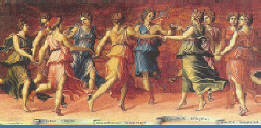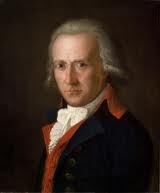|
|
Matthisson was born at Hohendodeleben near Magdeburg to an impoverished clerical family.
His father had died shortly before his birth with the consequence that he was cared for
by a doting aunt and later by grandparents. On their early deaths, however, he was
educated at the village school in Klosterberge where he read widely and became acquainted
with the works of several literary figures.
From 1778 to 1781 he studied theology and philosophy at the University of Halle subsequently
becoming a teacher at Dessau and, when that school had closed down, tutor and travel
companion.
He travelled throughout Germany making the acquaintance of many literary figures and
married in 1793 a lady in waiting to the duchess Luise von Anhalt-Dessau, in whose service
he later entered, but he was divorced in 1797. He continued in the service of the duchess
as companion and courier until her death in 1811. He travelled with her throughout
Switzerland, Austria and Italy writing poetry of a lyrical and naturalistic tendency.
He was a loyal and supportive courtier. His highly regarded ability to serve the courts
and to relate both to the quality and to numerous literary figures proved advantageous
enabling him to be raised to the nobility in 1809. He married again in 1810 and took
service as librarian and theatre director until 1825 with Friedrich II. von Württemberg,
having praised the duke as forthcoming Elector in an Ode of 1802. He retired to Wörlitz
in 1827.
His output consisted largely of travel writings but his adherence to the norms of the
classical era, his lyrical style and his attachment to German sensitivities ensured that
he enjoyed great poetic success with the public although becoming, as a result, cast
aside by the changing realities developing in the reconstructive era of the new century.
Some of his verses were set to music, however, of which Beethoven's setting of Adelaide
ensures eternal remembrance of his works.
|

